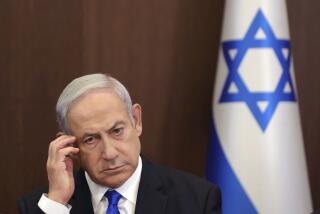Kenya to Charge 4 Suspects in Mombasa Bombing
- Share via
NAIROBI, Kenya — Bowing to intense pressure from Western governments to take action against terrorists, Kenya’s top prosecutors announced Monday that they will file murder charges this week against four men who last year allegedly helped blow up an Israeli-owned resort in the coastal city of Mombasa, killing at least 16 people.
Kenyan Justice Minister Kiraitu Murungi also pledged to push through parliament a sweeping anti-terrorism law that would give local investigators more powers to detain and interrogate terror suspects who live or operate in this East African nation.
The actions follow a virtual shutdown of Kenya’s tourism economy triggered by a recent decision by British Airways to cease all flights to the country. In addition, throngs of tourists canceled reservations after the U.S., British and other governments warned against coming here, citing threats of an imminent terrorist attack against Western interests. Thousands of workers in Kenya’s hotels, restaurants and tour guide companies, among other businesses, have been laid off.
Last week, the new U.S. Embassy -- which replaced one destroyed in 1998 by a truck bomb linked to Osama bin Laden’s Al Qaeda network -- was ordered closed for at least three days after diplomats received intelligence reports that terrorists were planning to strike again.
At Monday’s news conference, Murungi said the Kenyan government, which took office a month after the Mombasa attack, decided to take the latest actions because terrorism “is now threatening the entire economy and discouraging existing and potential investors.”
In a television interview broadcast last week, U.S. Ambassador Johnnie Carson lamented that Kenya had not made a single arrest of anyone linked to the Mombasa bombing. “In the last 2 1/2 to 3 years, we have had a number of terrorist activities around the world,” Carson said. “In every case, save in Kenya, the individuals have been arrested by their governments, put on trial, and in most cases, convicted and punished.
“The problem, as we see here, quite honestly, is that we believe there are Al Qaeda terrorists in Kenya, and that some of them are Kenyan citizens,” the ambassador said.
By announcing the plan to file murder charges, the Kenyan government wanted to dispel any notion that it was not responding to the threat of global terrorism, Murungi said. Late Monday, the U.S. Embassy released a statement saying that it applauded the efforts.
Over the weekend, a paramilitary wing of the Kenyan police surrounded sections of Eastleigh, a poor neighborhood of Nairobi, the capital, inhabited by many Somali refugees, and detained 40 people for questioning. The Kenyan government also banned flights to and from Somalia.
U.S. officials have expressed concern that Kenya’s porous border with Somalia, which has been in the hands of warlords since the Somalian national government fell in 1991, could easily be penetrated. Weapons and explosives from the Horn of Africa country could be smuggled across Africa to target Western interests.
On the same day suicide bombers blew up the Mombasa resort, unidentified men fired missiles from shoulder-held launchers at an Israeli airliner departing Moi International Airport in Mombasa. The surface-to-air missiles missed their target. Sources said the missiles were probably brought across the border from Somalia.
At Monday’s news conference, Philip Murgor, Kenya’s top prosecutor, identified three of the suspects as Kubwa Mohammed; his father, Mohammed Kubwa; and Aboud Rogo Mohammed. Murgor refused to identify the fourth suspect and declined to say if it was Fazul Abdullah Mohammed, believed to be involved in the bombings of the U.S. Embassy in Nairobi and the Israeli-owned Paradise hotel in Mombasa.
The three men were charged in March with harboring an illegal immigrant who was thought to be Mohammed, a native of the Comoros in the Indian Ocean. But Murgor said fresh evidence tied them to the Mombasa blast.
More to Read
Sign up for Essential California
The most important California stories and recommendations in your inbox every morning.
You may occasionally receive promotional content from the Los Angeles Times.













